One minute I had left New York the night before and Manhattan was so peaceful, and now the world had been tipped upside down. Lleyton Hewitt
Tennis.com Interview
Two days after Lleyton Hewitt won the US Open, the world changed. The Aussie recalls that moment, part of a Hall of Fame career
By Steve Flink Sep 12, 2021Tennis.com Interview
Jan-Lennard Struff sees Munich title defense bid as 'perfect opportunity' to turn 2025 around
By Emma Storey Apr 14, 2025Tennis.com Interview
Lorenzo Musetti manifested his 'special' week in Monte Carlo with first Masters 1000 final
By Matt Fitzgerald Apr 12, 2025Tennis.com Interview
No logic, just a feeling: Andrey Rublev "always knew" he wanted to work with Marat Safin
By Matt Fitzgerald Apr 07, 2025Tennis.com Interview
Brad Gilbert, Patrick McEnroe weigh in on U.S. men's tennis evolution
By Pete Bodo Apr 05, 2025Tennis.com Interview
Patrick McEnroe decries Jannik Sinner suspension, tags Joao Fonseca as future star
By Steve Tignor Apr 04, 2025Tennis.com Interview
On chicken farm, Danielle Collins embraces “crunchy granola lifestyle”
By David Kane Apr 03, 2025Tennis.com Interview
Feeling like a teenager, Alizé Cornet, 35, makes triumphant comeback from retirement
By David Kane Apr 02, 2025Tennis.com Interview
Danielle Collins launches iconic richsport merch collab
By David Kane Mar 07, 2025Tennis.com Interview
Zizou Bergs: From TikTok to Top 50 in Indian Wells?
By David Kane Mar 06, 2025Tennis.com Interview
Two days after Lleyton Hewitt won the US Open, the world changed. The Aussie recalls that moment, part of a Hall of Fame career
Published Sep 12, 2021
Advertising
Twenty years ago on Tuesday, September 11, New York City was shaken to its core by an unthinkable tragedy. On that horrific day, four airplanes were hijacked by al-Qaeda terrorists who conducted suicide attacks aimed at American targets. One of those aircraft hit the Pentagon just outside Washington, D.C. Another, bound for the White House or the U.S. Capitol, crashed in a Pennsylvania field.
To this day, New Yorkers most vividly and horrifyingly recollect the two planes crashing into the World Trade Center about seventeen minutes apart, causing massive death and destruction, and irrevocably altering the psychological lives of inhabitants in the city. Nearly 3,000 people perished on that fateful day, and the reverberations were felt in every corner of the globe.
Two days earlier, Lleyton Hewitt—a 20-year-old Australian with one of the largest hearts and toughest minds in the game of tennis—celebrated a seminal moment in his sterling career, capturing the US Open title with a 7-6 (4), 6-1, 6-1 win over Pete Sampras in Arthur Ashe Stadium. Hewitt was delighted he had secured his first major in singles and displayed his finest tennis against one of the greatest players of all time.
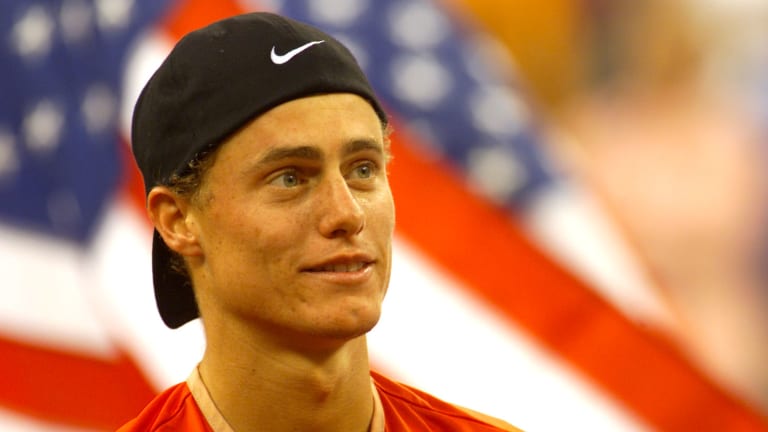
On September 9, 2001, Lleyton Hewitt defeated Pete Sampras in one of the performances of his career to win his first Grand Slam singles title.
© Getty Images
Advertising
The next day, Hewitt honored his champion’s responsibilities with the media in New York, and then it was time to leave town to presumably celebrate his win more fully back home in Australia. But then he found out, from 30,000 feat in the air, that New York was not the same festive city he had just left behind.
“It was a surreal moment winning the tournament,” Hewitt recalled during a recent Zoom session. “That Sunday night I went out with my mates from the Western Bulldogs football team who were over in the U.S. and watched my match with Pete. The following morning I went and did all the media interviews and photographs, and then I had to get out of New York. I was on a 5 p.m. flight on Monday through L.A., and then on to Sydney because I had to get back to play the Davis Cup semifinals against Sweden. I really had to rush out of New York that day.”
It was not until during his flight to Sydney that Hewitt learned about the nightmare that had engulfed New York.
“I was mid-flight when everything happened with 9/11 in New York,” Hewitt remembers. “Thinking back now, there were a couple of airline hostesses mid-flight that were in the galley crying together. I guess they had just been told what happened in New York.
“We landed in Sydney, and then the pilots explained to everyone on our flight that we had to stay on the plane because the federal police in Australia were going to come on and ask us if we noticed anything at the airport in New York before we left the previous night.”
Hewitt paused briefly to collect his thoughts, then added:
“We just couldn’t picture the horror that had happened because we hadn’t seen any footage yet. One minute I had left New York the night before and Manhattan was so peaceful, and now the world had been tipped upside down.
“For me it was tough because I was obviously on Cloud Nine after winning the US Open, and thrilled that I had won my first major, but now there were a lot more things going on in the world that were so much more important than me winning a tennis tournament. I was meant to be doing a big press conference at the Sydney airport as soon as I landed, but that got cancelled pretty quickly, because there were a lot bigger news stories going around.
“I was most concerned about the people I knew that were still in Manhattan that I had been hanging out with, and wondering how they were doing, and if they were caught up in that. After the Open some of these people stayed in New York and were being tourists. So it was pretty hard until I knew they were all okay.”
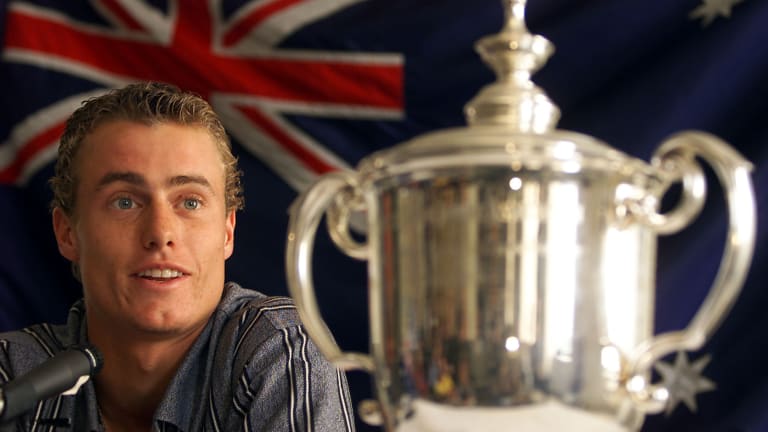
Hewitt, seen here on September 10 in New York, was on a plane back to Australia when he heard the news.
© Getty Images
Advertising
Even now, two decades after the fact, Hewitt remains philosophical when talking about 9/11. But he is able to separate that horrific time in human history from the joy he found in collecting the US Open title. His “nearly flawless” straight-set dissection of Yevgeny Kafelnikov in the semifinals carried him into his final with Sampras with conviction. But he was not overconfident.
“To be honest,” explains Hewitt, “playing your first major final you are never a hundred percent sure how the nerves are going to kick in until you are actually out there. But I felt pretty relaxed because I was the underdog. I will never forget going out on the court for the coin toss, playing against the great Pete Sampras whom I idolized as a junior. And another guy I idolized, Ivan Lendl, was doing the coin toss for us. There were all of these fans in this big Arthur Ashe Stadium and I had these two all-time greats standing alongside me. But once I got through the warmup and got into the match I felt in control of my emotions, which was really important.”
The opening set of the final was pivotal. Going for his fifth Open title, Sampras had ousted the three men—Patrick Rafter, Andre Agassi and Marat Safin—who had taken the title since he had last won it in 1996. The prodigious American might have been unstoppable if he had prevailed in the first set.
But after an early exchange of service breaks, they went to a tie-break. Hewitt came through deservedly in that sequence and never looked back, granting the towering American only two more games across the last two sets.
“I had lost to Pete in the semifinals the year before in a tight three set match with a couple of tie-breaks, so I knew how important the first set of our final would be,” Hewitt says. “I was able to get that tie-break and my confidence went up while I felt he lost a bit of his spark. I sensed it was a matter of me jumping on him early in the second set, which I did.”
Hewitt’s return of serve was magnificent, regarded by many authorities as the sport’s finest, perhaps even better than Andre Agassi’s. His unrelenting depth off the ground and spot serving were also outstanding, and he could do no wrong those last two sets.
“In terms of my return of serve, my movement around the court, my passing shots and my lobs, I couldn’t have done much better those last two sets. I don’t think I hardly missed a ball. I am not actually sure if I missed a return of serve. Whenever I got my racquet on Pete’s first or second serve I made him play a tough volley. I felt like I had him second guessing his game plan. It was an amazing feeling to beat Pete Sampras in my first major final.”
I was obviously on Cloud Nine after winning the US Open, and thrilled that I had won my first major, but now there were a lot more things going on in the world that were so much more important than me winning a tennis tournament. Lleyton Hewitt
Advertising
Andy Roddick had nearly prevented Hewitt’s flourish at the end of that 2001 US Open when he pushed the Australian to five hard sets in the quarterfinals. Recollecting that crackling nighttime clash, Hewitt says, “Only one or two points made the difference that night. Andy was a year younger than me but he was a kid who had a lot of firepower and a lot of belief in himself. He was hitting cold winners versus my counterpunching.
“The atmosphere in Arthur Ashe Stadium that night was unbelievable. But even though I was playing an American, one thing the crowd always appreciated was anyone going out there and giving a hundred percent and just laying it on the line. That was certainly something I always prided myself on.”
That indefatigable fighting spirit was a defining characteristic in Hewitt, who took the boost he got from winning the Open to rule at Wimbledon the following year. While breaking through in New York was monumental for Hewitt, his Wimbledon triumph in 2002 was similarly gratifying. As the top seed that year at the All England Club, he went five sets with the Dutchman Sjeng Schalken in the quarterfinals, but cut down everyone else in straights, including Tim Henman and David Nalbandian at the end.
“For a kid growing up in Australia, Wimbledon is the biggest tournament there is. I used to wake up every morning and watch Wimbledon on Channel Nine in Australia. John Newcombe used to be commentating, and I watched the replay of Pat Cash beating Ivan Lendl in the 1987 final and climbing into the stands.
“To get the opportunity to be world No. 1 and the No. 1 seed, I certainly felt a lot of pressure. I guess winning your first major you get the monkey off your back, but then you get that weight of expectation being the No. 1 seed at a Grand Slam event. Plenty of Australian greats were there at Wimbledon wishing me the best of luck, so I felt like I was playing for Australia at that tournament.”
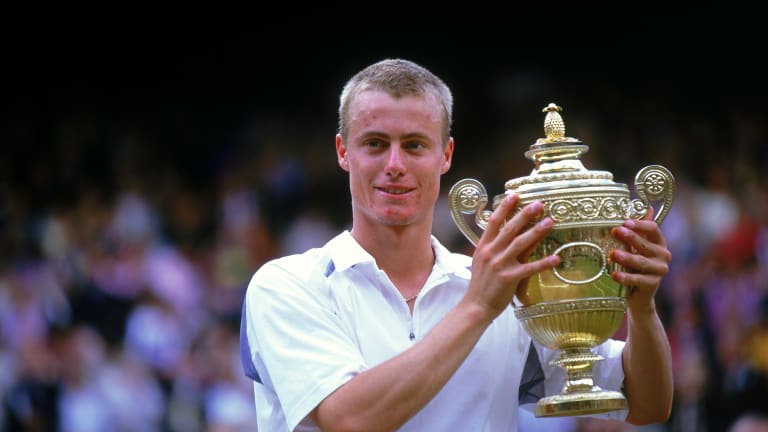
Hewitt won his second Grand Slam title less than a year after capturing his first, at Wimbledon.
© Getty Images
Advertising
Hewitt—who concluded both 2001 and 2002 at No. 1 in the world—did not win any more majors after Wimbledon and was often riddled by injuries. But he remained formidable, most prominently in Davis Cup. He had already been a central member of the victorious Australian squad in 1999 when he was only 18, but his contribution in 2003 was even larger.
In the semifinals, he sealed the Australian triumph over Switzerland with a stirring comeback from two sets to love down against a young Roger Federer, and then spearheaded the Australian win over Spain in the final.
“Roger had won his first Wimbledon that year. There was a lot at stake in that match. It was the fourth rubber. For two and-a-half sets Roger was just playing phenomenal tennis until he was trying to serve out the match in the third set and got a little shaky. I just had that never-say-die attitude that if he was going to win he was going to have to beat me to the finish line. He wasn’t quite able to do that. I turned it into a mental and physical five-set battle. That was the way I enjoyed playing my matches because I knew I trained as hard if not harder on the practice court and in the gym.
“Winning that way against Roger from two sets down was something I always dreamt of doing.”
Some longtime observers might feel that Hewitt’s most lasting disappointment would be his defeat in the 2005 Australian Open final against Marat Safin, because he was so close to winning his country’s championships. But he begs to differ.
“Getting to the final of the Australian Open was an unbelievable two weeks in my career,” he asserts. “Sure, it was disappointing to come so close and lose in the end, but I left everything out there on the court. I had a slight hip injury coming into the tournament and I was trying to manage that. I wasn’t hitting at all on my days off in between matches. I was purely playing my matches on adrenaline.
“That might have been my toughest draw that I ever had playing Arnaud Clement in the first round, James Blake second round, Juan Ignacio Chela third round, Nadal in the fourth round, Nalbandian in the quarterfinals and Roddick in the semis all before the final with Safin. I was just riding this wave of emotions with the Australian public. It took an unbelievable effort from Marat to turn that final around [Safin won 1-6, 6-3, 6-3, 6-3]. I was very proud of my achievement.”
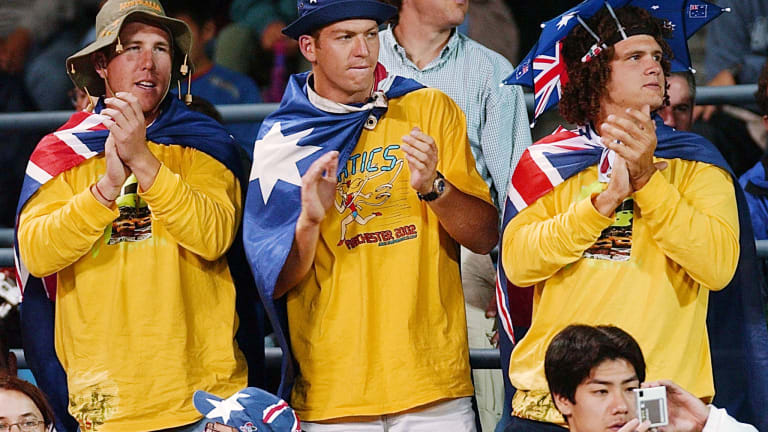
Hewitt's "Fanatics" followed him around the globe, including at his return to New York City in 2002.
© AFP via Getty Images
Advertising
As well he should have been. But as the years unfolded, Hewitt’s injuries mounted year by year, and a slice of his prime was taken away from him. He suffered a cracked rib in 2005, a back injury in 2007, was hurt in 2008 leading to a left hip surgery in 2009, and he endured a right hand injury in 2010. The spiral continued with a left foot surgery in 2011, and then toe surgery the following year.
He remained dangerous on his best days. Hewitt toppled Federer in the Halle final on grass in 2010, and beat the Swiss again in the Brisbane final of 2014. In 2016 at the Australian Open—when he was nearly 35—Hewitt played his last official match at the Australian Open, losing to David Ferrer in the second round.
“I was fortunate the first half of my career to have no serious injuries whatsoever,” says Hewitt. “Then it started mounting up. The hip surgeries care out of the blue, but in the end especially, the left one had to be dealt with. And then the major surgery towards the end of my career was my toe. No one knew about it but for probably four or five years I was having injections just to be able to get on the court.”
Hewitt established himself as one of the steeliest competitors ever to step on a tennis court. He was elected to the International Tennis Hall of Fame as a member of the class of 2021, although he could not make the journey to Newport this past July due to the complications of travel back into Australia related to Covid-19.
But he is overjoyed by the honor, and looking forward to returning to Newport next summer.
“In the latter part of my career, I played the ATP 250 event there every year and enjoyed seeing the ceremonies for the Hall of Fame,” he says. “I have been through the museum with my family. I always knew how much it meant to be in the Hall of Fame. It is something that makes your whole career so special.
“I was able to play over 20 years on the tour and had some pretty good success. To be able to celebrate that with my family and friends at the Hall of Fame induction is the most important part of it. For me to push this back one year is not a big deal. I am really looking forward to Newport next year.”
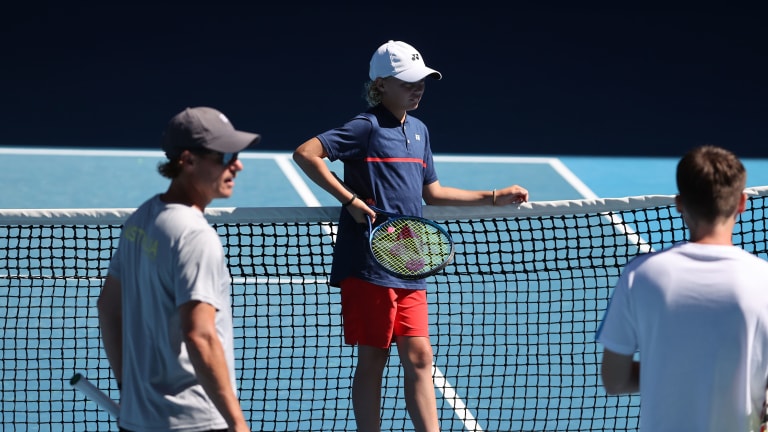
Lleyton and his son, Cruz—a notable tennis player himself—at the 2021 Australian Open.
© AFP via Getty Images
Advertising
Meanwhile, Hewitt has plenty on his plate at the moment as he guides his son’s junior tennis career back in Australia. Cruz Hewitt won the Australian 12-and-Under Clay Courts earlier this year.
“It is unique to see your son playing junior tennis, whether it is at the local club or at international junior events here in Australia,” he says. “I get a thrill out of seeing him out there enjoying his tennis. He is under the spotlight any time he goes and plays matches. I feel for him in that way, but he loves competing. I know him better than anyone else, but it is good for him to hear from other people and not just Dad. That will be a key for him. He has done sessions with Tony Roche which are just priceless.”
Hewitt has been Davis Cup captain for Australia the past several years and compares, watching his son compete to the feeling of watching his Davis Cup players.
“It is like sitting on the side with Davis Cup. It is a lot more stressful being either a coach or a parent watching tennis than it is being out there playing in Grand Slam finals. Even in Davis Cup as captain you play a very small part on the side of the court watching because it is up to them. They have to execute and you have your hands tied in a lot of ways. That is a lot more nerve wracking. You are not in control.”
But all through the 2001 US Open and across his entire career, Lleyton Hewitt was largely in control of his destiny with his unrivaled fighting spirit.
“I would like to be remembered as someone who gave absolutely 100 percent every time I stepped on the court,” he says. “No matter what the conditions or the opponent, or whatever it might have been, I gave it everything I had and played with a lot of passion.”